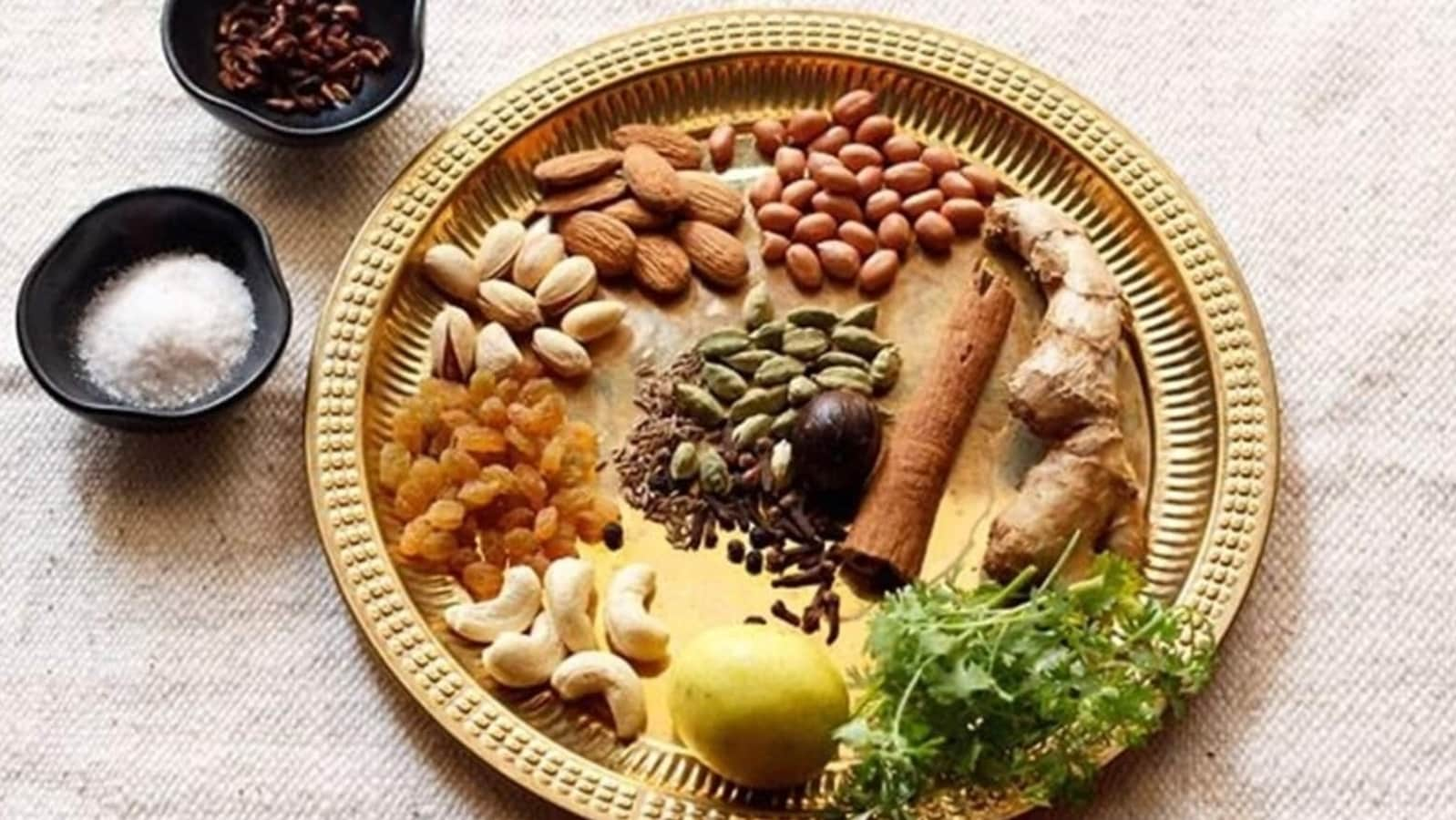
[ad_1]
Chaitra Navratri fasting is set to begin on April 9, Tuesday. The nine-day fasting period is the time to detox, worship Maa Durga, spend some time in spiritual reflection, and rejuvenate the body and the mind. Navratri diet consisting of vrat-friendly grains, hydrating vegetables and fruits, nuts, seeds, and millets are full of nutrients and nourish the body well if eaten in moderation and cooked in a healthy way. Deep fried foods and overindulging in even satvik foods can lead to weight gain, spike in blood sugar levels, and exacerbate symptoms of chronic health issues. (Also read | Chaitra Navratri 2024: From red to sky blue; check out day-wise colours and their significance)

Besides, it is important to maintain a balanced diet during Navratri and include all essential food groups like high protein foods, complex carbs, fibre, vitamins and minerals. Not drinking enough water, including fibre in your diet or having hydrating foods can cause digestive trouble from constipation to bloating. There are plenty of vrat-friendly foods that can fulfill your daily nutritional requirements. While consumption of milk, paneer, kuttu atta, nuts, seeds, amaranth will take care of your protein requirements, curd and buttermilk are essential for your digestive health. Fruits and vegetables are an important dietary addition for the much-needed antioxidants and vitamins.
During Navratri, grains like wheat and rice, non-vegetarian foods, eggs, onion, garlic and other tamasic foods are prohibited.
Here’s a list of Navratri foods that must be consumed and those who should be avoided.
Navratri foods to eat and avoid
1. Hydrating fruits and veggies: As Chaitra Navratri falls in warmer months, it’s important to increase intake of hydrating fruits and vegetables during this time. Fruits like oranges, grapes, watermelon, muskmelon, cucumber, tomatoes, will make sure you not only have enough fibre in your system, but also a generous dose of vitamins and minerals that can keep your immunity high while also boosting your energy levels during the day.
2. High-protein foods: Having foods high in protein during your fast will not only help provide sustained energy throughout the day, but also keep you full for longer. From milk and milk-based products like paneer to kuttu atta and amaranth, there are plenty of protein options to choose from.
3. Probiotics like buttermilk and curd: Eating goods rich in probiotics will not only support your gut health but can also boost your immune system. It will also help boost your energy levels apart from better mood.
4. Millets: Buckwheat, barnyard millet, foxtail millet, little millet are all a storehouse of essential nutrients and can help increase energy levels while preventing weight gain. You can add them to your pulao, soup, porridge etc. Make sure not to consume them in deep-fried forms like poori and pakora.
5. Potatoes, bottle gourd, pumpkin: Light and easy to digest vegetables must be preferred during fasting that will help support detox and rejuvenation. Pumpkin and bottle gourd are high in fibre and essential nutrients and are easy on stomach.
6. Makhana and peanut: Makhana is a great source of calcium, magnesium, phosphorous and potassium while peanut too is an important source of many vitamins and minerals like copper, niacin, folate, manganese etc. Snacking on makhana and peanut will also keep your hunger pangs at bay.
Foods to avoid during Navratri fast
1. Onion and garlic: They are not only prohibited for people who are fasting but even those who are not. They are considered tamasic and must not be added to the tempering while making vegetable curries. They should also be skipped in salads during this time.
2. Grains and cereals: Grains and cereals like Rice, wheat and lentils are not allowed during Navratri fast. They are usually replaced by falahaari foods like samak ke chawal, kuttu ki roti, amaranth and water chestnut flour.
3. Non-vegetarian foods: Being tamasic foods, non-veg foods like chicken and mutton are strictly prohibited during Navratri fasting and even by those Hindus who aren’t observing fast.
4. Processed or deep-fried food: While people usually love to eat deep fried foods like kuttu ki puri and singhare ke pakore during navratri, they can overload digestive system, cause acidity and constipation instead of detoxing your system.
5. Table salt: Being refined, table salt is not permitted during Navratri fasting and is replaced by sendha namak. Some people skip the salt altgoether.
[ad_2]
Source link








